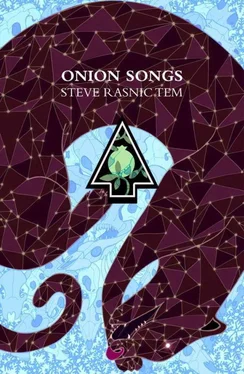Some days he would wander the lanes, searching the short streets, the forgotten streets, for nothing. The Rue Abattue D’enfant , the Rue des Veuves Aveugles , the Rue D’âmes Vidées . Some days he would walk to the river, and watch there. He could not remember the river’s name, but thought it might be the Seine, the Thames, the Vltava.
Some nights he climbed the shaking steps to his attic room. But Degaré now lived there. He said he had always lived there. “ Monstre!” the burly Frenchmen shouted. “ Meurtrier! Can you not leave me alone? You do not live here!”
Some nights he slept where he could. Some nights he wandered without sleeping.
Was he starving? Did it matter?
Everywhere he went people stared. They did not stare just at him—they stared at everything.
He himself stared, he was always staring. He did not want to miss any vanishing detail. In this at least they were brothers and sisters.
There was much he had forgotten, and yet there was much he still knew. Every idea in him had its own voice, every stray thought its own head. In him there were multitudes. He thought perhaps that particular idea might be from the Bible, but he did not know for sure.
He might be sad, he thought. He very well might be. But he could not be sure. He waited for all these other voices to tell him.
He calls himself Fish because he swims at the bottom of the pond. Most everybody he knows glides so easy above, like life wasn’t even a second thought, even the ones who live hard, who fill their insides with sewage, they’re still high in the sky as far as Fish is concerned.
He don’t mind. Sometimes it’s safer swimming at the bottom. He can look up at their faces and see they’re looking at each other, hating on each other, but not seeing him at all.
“Get outta there, Fish!” That’s his brother Paul. But Fish just found somebody’s ring in the Trench, and he has hopes for more. Paul keeps his distance from the Trench, he has no belly for it, the Trench where they dump the bodies before they burn them. Bodies lay there two, three days so they smell like nothing ever smelled before, mommies and daddies and kiddies waiting to be burned by the burning crews, always short-handed, it being such a foul job. Fish has seen the burning, and he thinks it’s pretty, the way the flames go blue in places, like they caught a soul—souls burn blue. Houses of people, blocks of people, cities of people are dying every day—pretty soon, Fish thinks, the whole world will burn blue.
But Fish finally gives it up, crawls out and rolls around in the dirt to get the stink off, then crabs after Paul, low to the ground where Fish feels safe, the ring hid in his pants pocket. Paul says it’s time to eat, and Fish was born hungry.
Along the way they stay out of trouble even though trouble passes the time. Trouble always means you eat late.
Some slime-head has his tongue down the mouth of a little girl, but they pass him by like he was scenery, even though it makes Fish’s teeth ache.
Some bald woman sits in water and screams, pinching skin until she’s black-spotted, scratching herself until the skin runs.
A clean-up crew chatters about nothing while they beat an old man with electric fans and toasters, slinging any machine with a cord into the wrinkled face, snapping ribs, pounding dead arms and legs. Paul pushes Fish’s head away so he don’t see.
A so pretty lady lies on a sofa in the middle of the street. She’s been harvested, her parts replaced with rotten potatoes and corn. Fish gets away from Paul and swims right up to her. He don’t get upset—he just looks a long while trying to figure out what he sees.
Most of the houses are burning, those dead families a cloud of smell that creeps across the sky. But the sunset is still something beautiful, like Paul says it’s been since the beginning of time.
When they get home Mama has the food hot and waiting. But Fish swims in slow, careful of a kick and a stomp, a belt across the ear.
“Paul, get your brother up off the floor,” Mama says, and it’s like the daylight finally come, and Fish sees himself in the bright new kitchen, and there’s a great green tree out the window, and the voices of little kids playing outside.
“He was talking crazy again, Ma,” Paul sings like a crow, “and jumping out of his wheelchair, rolling around on the ground. It was embarrassing! I wish you’d let me tie him in if I have to take him out!”
“We’re not tying your brother to a chair like he was some kind of animal! Not like they do in those places. We’re his family , and it’s an honor for you to mind him. Some day you’ll understand that, I pray when it’s not too late.”
Mama cries as she and Paul help Fish back up into his chair, and Paul says he’s sorry, and everybody’s sad. Except for Fish, and Mama’s new boyfriend, standing in the door.
Fish jerks his head around, and remembers, laughing loud because they live in such a nice place, with sunshine and linoleum and good smells and no Trench outside waiting for them to make a mistake.
And then Fish looks at Mama’s new boyfriend again: the smoke in his face, the blue fire in his eyes, and remembers, and remembers there are things in the pond that swim even lower than Fish.
The elevator is the dullest of the conveyances humankind has devised. Each year I tell the young doctors, the ones who come here eager to learn the art of psychiatry, that we should model this device after the merry-go-round. The elevator takes you from a spot on one floor, to the same relative spot on the next. The distance left and right to the end of the corridors is the same from floor to floor. The machine provides no stimulation. Moving vertically, it provides only a minimal illusion of progress.
But a similar device based on the merry-go-round: there, at least, would be a kind of stimulation. There would be different spatial relationships to experience at each floor, and the return trip back up to your room would be different from the descending trip. The overall experience would be a small, but therapeutic, one. I would think that in a top-ranked psychiatric hospital, such as this one, that would be an important consideration.
Each year the brighter ones in the new class of doctors feel obliged to answer my proposal. Their counters are always the same. Their knowledge of economics and spatial relationships, after an afternoon spent formulating the answer, will lead them to the conclusion: “That kind of arrangement would take up far more of a building’s space than the standard vertical elevator. It would require an entire vertical slice of the building, at a depth equal to that of the elevator. And you would have to build a second elevator opening for every floor with the exception of the top and bottom floors. And that space could have been used for more rooms, offices, so you’d lose all that rental income as well.”
Their knowledge of physics, after an afternoon spent drawing diagrams, will lead them to the conclusion: “A device like that would require much more time to travel from floor to floor than the standard vertical elevator. The passenger booth would be traveling along the circumference of a large circle in order to reach various vertical debarkation points. So of course they’d be traveling a much longer distance than they would using an ordinary vertical conveyance. And the speed would probably have to be somewhat slower, to compensate for the physical effects brought about because of centrifugal force.”
Good, well-thought-out answers. And each year I reply, “So? So who cares if it is slower, and less economical?” And thereby teach the doctors a lesson in humanity, if they care to let one in.
Читать дальше












